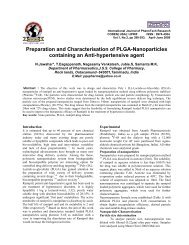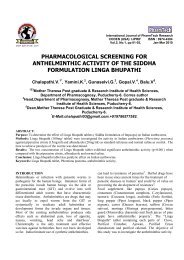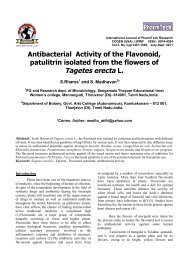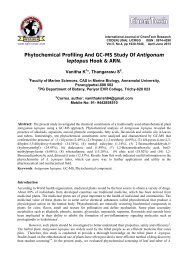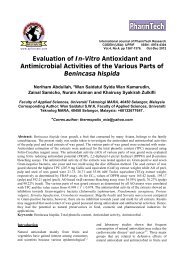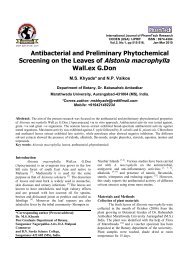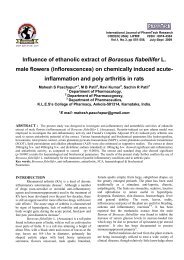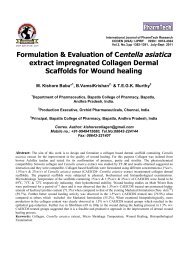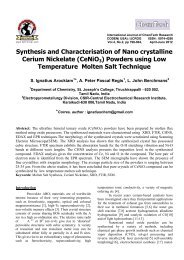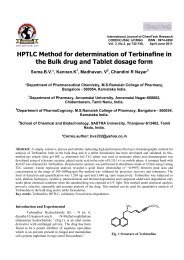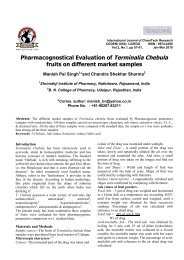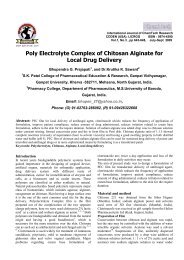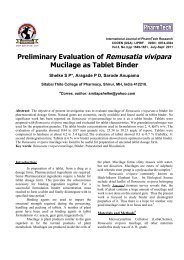Pharmacological and Therapeutic Activity of Cissus quadrangularis ...
Pharmacological and Therapeutic Activity of Cissus quadrangularis ...
Pharmacological and Therapeutic Activity of Cissus quadrangularis ...
Create successful ePaper yourself
Turn your PDF publications into a flip-book with our unique Google optimized e-Paper software.
International Journal <strong>of</strong> PharmTech Research<br />
CODEN (USA): IJPRIF ISSN : 0974-4304<br />
Vol.2, No.2, pp 1298-1310, April-June 2010<br />
<strong>Pharmacological</strong> <strong>and</strong> <strong>Therapeutic</strong> <strong>Activity</strong> <strong>of</strong> <strong>Cissus</strong><br />
<strong>quadrangularis</strong>: An Overview<br />
Garima Mishra 1* , Saurabh Srivastava 2 , B.P.Nagori 3<br />
*1 Swami Vivekan<strong>and</strong> College <strong>of</strong> Pharmacy, Ch<strong>and</strong>igarh Patiala Highway, Sector-8, Banur<br />
(Ramnagar), Teh. Rajpura, Patiala. INDIA.<br />
2 University Institute <strong>of</strong> Pharmaceutical Sciences, Panjab University,<br />
Ch<strong>and</strong>igarh-160014. INDIA.<br />
3 Lachoo Memorial College <strong>of</strong> Science <strong>and</strong> Technology, Jodhpur-3420003.<br />
Rajasthan. INDIA.<br />
* Corres.author: garima_pharmchem@yahoo.co.in, Ph: 09780580180<br />
ABSTRACT: Since ancient ages plants have served human beings as a natural source <strong>of</strong> treatments <strong>and</strong> therapies,<br />
amongst them medicinal herbs have gain attention because <strong>of</strong> its wide use <strong>and</strong> less side effects. In current scenario focus<br />
on plant research has increased throughout the world <strong>and</strong> a huge amount <strong>of</strong> evidences have been collected to show<br />
immense potential <strong>of</strong> medicinal plants used in various traditional systems. More than 15000 plants have been studied<br />
during the last 5 year period. Recently scientists are using these renewable resources to produce a new generation <strong>of</strong><br />
therapeutic solutions. Inspite <strong>of</strong> many synthetic compounds, the most efficient drugs available are directly or indirectly<br />
related with the plant kingdom. Many <strong>of</strong> the plant extracts have proven to posses pharmacological actions. Production<br />
<strong>and</strong> cost advantages <strong>of</strong> plant-made pharmaceuticals can allow more capital to be invested in research <strong>and</strong> development<br />
<strong>of</strong> new therapeutics, giving patients access to new drugs faster. This review highlights some <strong>of</strong> the phytochemical <strong>and</strong><br />
pharmacological aspects <strong>of</strong> <strong>Cissus</strong> <strong>quadrangularis</strong> Linn. <strong>Cissus</strong> <strong>quadrangularis</strong>, a perennial climber widely used in<br />
traditional medicinal systems <strong>of</strong> India has been reported to posses bone fracture healing, antibacterial, antifungal,<br />
antioxidant, anthelmintic, antihemorrhoidal <strong>and</strong> analgesic activities. <strong>Cissus</strong> <strong>quadrangularis</strong> Linn. Has been recognized<br />
as a rich source <strong>of</strong> carotenoids, triterpenoids <strong>and</strong> ascorbic acid <strong>and</strong> is proved to have potential for medical effects,<br />
including “Gastroprotective activity” in conjugation with NSAID therapy <strong>and</strong> in “Lipid metabolism <strong>and</strong> oxidative<br />
stress”. Needless to say that versatile uses <strong>and</strong> various therapeutic activities has made the plant a valuable medicinal<br />
herb.<br />
KEYWORDS: <strong>Cissus</strong> <strong>quadrangularis</strong>, phytochemical constituents, Hadjod, Phytochemistry, <strong>Pharmacological</strong> activities.<br />
INTRODUCTION<br />
<strong>Cissus</strong> <strong>quadrangularis</strong> (Linn) has been used by<br />
common man in India for promotion <strong>of</strong> fracture<br />
healing <strong>and</strong> well known as “Hadjod”. It is also known<br />
as Vitis <strong>quadrangularis</strong> Wall. Which belongs to family<br />
Vitaceae. It is a common perennial climber, which is<br />
distributed throughout India particularly in tropical<br />
regions. The plant is commonly known as Vajravalli in<br />
Sanskrit, Hadjod in Hindi, K<strong>and</strong>vel in Marathi,<br />
Haddjor in Punjabi, Hadbhanga in Oria, Vedhari in<br />
Gujrati, Per<strong>and</strong>i in Tamil, Nalleru in Telugu <strong>and</strong><br />
Veldgrap, Edible Stemmed Vine in English.<br />
It requires warm tropical climate <strong>and</strong> propagated by<br />
stem cuttings in months <strong>of</strong> June <strong>and</strong> July. It is a<br />
climbing herb, tendrils simple, opposite to the leaves,<br />
leafless when old. Leaves simple or lobed, cordate,<br />
broadly ovate or reniform, serrate, dentate, sometimes<br />
3-foliate <strong>and</strong> glabrous. Flowers small, greenish white,<br />
bisexual, tetramerous, in umbellate cymes, opposite to<br />
the leaves. Calyx is cup shaped. Fruit globose or<br />
obovoid fleshy berries, succulent, very acrid, dark<br />
purple to black, one seeded; seeds ellipsoid or<br />
pyriform. Stem is buff colored with greenish ting,
Garima Mishra et al /Int.J. PharmTech Res.2010,2(2) 1299<br />
dichotomously branched, sub- angular, glabrous,<br />
[1, 2]<br />
fibrous <strong>and</strong> smooth.<br />
It has been prescribed in Ayurveda as an alternative,<br />
anthelmintic, dyspeptic, digestive, tonic, analgesic in<br />
eye <strong>and</strong> ear diseases, <strong>and</strong> in the treatment <strong>of</strong> irregular<br />
menstruation <strong>and</strong> asthma. In some parts <strong>of</strong> world, the<br />
whole plant is used in oral re-hydration, while the leaf,<br />
stem, <strong>and</strong> root extracts <strong>of</strong> this plant are important in<br />
the management <strong>of</strong> various ailments. Some other<br />
reports on <strong>Cissus</strong> <strong>quadrangularis</strong> justifies its<br />
effectiveness in management <strong>of</strong> obesity <strong>and</strong><br />
complications associated with metabolic disorders [3] ,<br />
as well as its antioxidant <strong>and</strong> free radical scavenging<br />
activity in vitro. [4, 5] In current scenario formulations<br />
now contain extracts <strong>of</strong> <strong>Cissus</strong> <strong>quadrangularis</strong> in<br />
combination with other active ingredients, used for the<br />
purpose <strong>of</strong> management <strong>of</strong> overweight <strong>and</strong> obesity, as<br />
well as complications resulting from these conditions,<br />
specifically metabolic syndrome (syndrome X).<br />
Phytochemical screening <strong>of</strong> <strong>Cissus</strong> <strong>quadrangularis</strong><br />
revealed high contents <strong>of</strong> ascorbic acid, carotene,<br />
anabolic steroidal substances, <strong>and</strong> calcium. The stem<br />
contains two asymmetric tetracyclic triterpenoids, <strong>and</strong><br />
two steroidal principles. The presence <strong>of</strong> β-sitosterol,<br />
δ-amyrin, δ-amyrone, <strong>and</strong> flavanoids (quercetin)<br />
having different potential metabolic <strong>and</strong> physiological<br />
[6, 7]<br />
effects has also been reported.<br />
[2, 20]<br />
CLASSIFICATION:<br />
Kingdom : Plantae<br />
Division : Magnoliophyta<br />
Class : Magnoliopsida<br />
Order : Vitales<br />
Family : Vitaceae<br />
Genus : <strong>Cissus</strong><br />
Species : <strong>quadrangularis</strong><br />
THERAPEUTIC USES:<br />
The stout, fleshy quadrangular stem is traditionally<br />
used for the treatment <strong>of</strong> gastritis, bone fractures, skin<br />
infections, constipations, eye diseases, piles, anemia,<br />
asthma, irregular menstruation, burns <strong>and</strong> wounds. The<br />
leaves <strong>and</strong> young shoots are powerful alteratives.<br />
Powder is administered in treatment <strong>of</strong> hemorrhoids<br />
<strong>and</strong> certain bowl infections. The juice <strong>of</strong> stem is useful<br />
in scurvy <strong>and</strong> in irregular menstruation whereas the<br />
stem paste boiled in lime water is given in asthma. It is<br />
also used as a powerful stomachic. <strong>Cissus</strong><br />
<strong>quadrangularis</strong> Linn. has potent fracture healing<br />
property <strong>and</strong> antimicrobial, antiulcer, antioxidative,<br />
antiosteoporotic, gastroprotective, cholinergic activity<br />
as well as beneficial effects on cardiovascular diseases.<br />
[8]<br />
It has been investigated that methanolic extract <strong>of</strong><br />
<strong>Cissus</strong> <strong>quadrangularis</strong> possesses antiulcer <strong>and</strong><br />
cytoprotective property in indomethacin induced<br />
gastric mucosal injury. The aqueous extract also shows<br />
acetylcholine like activity on isolated ileum <strong>of</strong> rabbit<br />
<strong>and</strong> uterus <strong>of</strong> rat. The action on dog blood pressure is<br />
analogous to muscarinic <strong>and</strong> nicotinic actions <strong>of</strong><br />
acetylcholine. Ethyl acetate fractions <strong>of</strong> both fresh <strong>and</strong><br />
dry stem extracts show antioxidant activity. The ethyl<br />
acetate extract <strong>and</strong> methanol extract <strong>of</strong> both fresh <strong>and</strong><br />
dry stem further exhibit antimicrobial activity against<br />
gram-positive bacteria including Bacillus subtilis,<br />
Bacillus cereus, Staphylococcus aureus <strong>and</strong><br />
Streptococcus species. Due to its widespread <strong>and</strong><br />
versatile therapeutic uses as well as pharmacological<br />
actions, the present study highlighted the health<br />
promoting <strong>and</strong> therapeutic properties <strong>of</strong> <strong>Cissus</strong><br />
[9, 10, 11, 12]<br />
<strong>quadrangularis</strong>.<br />
PHYTOCHEMISTRY:<br />
Phytochemical studies <strong>of</strong> <strong>Cissus</strong> <strong>quadrangularis</strong> have<br />
shown the presence <strong>of</strong> various versatile constituents<br />
such as flavanoids, triterpenoids, Vitamin C, stilbene<br />
derivatives <strong>and</strong> many others, e.g. resveratrol,<br />
piceatannol, pallidol perthenocissin <strong>and</strong> phytosterols.<br />
Out <strong>of</strong> which ascorbic acid, triterpene, β-sitosterol,<br />
ketosteroid, two asymmetrical tetracyclic triterpenoids<br />
<strong>and</strong> calcium were identified as major constituents <strong>of</strong><br />
this plant.<br />
[7, 11, 13, 14]<br />
The <strong>Cissus</strong> <strong>quadrangularis</strong> contains high amount <strong>of</strong><br />
Carotene A, anabolic steroidal substances <strong>and</strong><br />
Calcium. The plant contains ascorbic acid, 479 mg <strong>and</strong><br />
carotene, 267 mg per 100 g freshly prepared paste, in<br />
addition to calcium oxalate. The stem <strong>of</strong> the plant<br />
contains two asymmetric tetracyclic triterpenoids,<br />
onocer – 7 ene 3 α, 21 β diol (Fig. 1) (C30H52O2 m.p.<br />
200 – 202 °C) <strong>and</strong> onocer - 7 ene – 3 β, 21 α diol (Fig.<br />
2) (C30H52O2, m.p. 233 – 234 °C). It also contains two<br />
steroidal principles –<br />
1. C27H45 O, melting point 249-252 °C<br />
2. C23H41 O, melting point 136-138 °C<br />
Presence <strong>of</strong> β-sitosterol (Fig.3), δ amyrin <strong>and</strong> δamyrone<br />
is also reported. The aerial parts <strong>of</strong> <strong>Cissus</strong><br />
<strong>quadrangularis</strong> is found to contain a new asymmetric<br />
tetracyclic triterpenoid, 7-Oxo-Onocer-8-ene-3 β 21 α<br />
diol (Fig 1) (C30H50 O3 , m.p. 235-237 °C).<br />
[15, 16, 17, 18, 19]<br />
Seven new compounds are also reported which are 4hydroxy<br />
2 methyl-tricos-2 ene -22- one, 9-methyloctadec-9-ene,<br />
heptadecyl- octadecanoate, icosanylicosanoate,<br />
31-methyl tritiacontan-1-ol, 7- hydroxy-<br />
20- oxo- docosanyl cyclohexane <strong>and</strong> 31-methyl<br />
tritiacontanoic acid. Small amount <strong>of</strong> taraxeryl acetate,<br />
friedelan-3-one, taraxerol <strong>and</strong> isopentacosanoic acid is
Garima Mishra et al /Int.J. PharmTech Res.2010,2(2) 1300<br />
also present. Presence <strong>of</strong> 3, 3’, 4, 4’-<br />
[20, 21, 22]<br />
tetrahydroxybiphenyl is also reported.<br />
Analysis <strong>of</strong> the air-dried <strong>Cissus</strong> <strong>quadrangularis</strong> plant<br />
reported to contain moisture 13.1, protein 12.8, wax<br />
1.0, fiber 15.6, carbohydrate 36.6, mucilage <strong>and</strong> pectin<br />
1.2 <strong>and</strong> ash 18.2%. The root powder also contain a rich<br />
source <strong>of</strong> mineral elements (mg/100g dry matter):<br />
potassium 67.5, calcium 39.5, zinc 3.0, sodium 22.5,<br />
iron 7.5, lead 3.5, cadmium 0.25, copper 0.5 <strong>and</strong><br />
[23, 24, 25, 26]<br />
magnesium 1.15.<br />
Analysis <strong>of</strong> the toxicants also revealed the presence <strong>of</strong><br />
oxalate, tannin, phytate, saponin contents (135, 0.3, 20,<br />
0.16 mg/100g <strong>of</strong> dry matter) respectively. The ash<br />
formed from the <strong>Cissus</strong> <strong>quadrangularis</strong> contains<br />
mostly carbonates <strong>and</strong> to a smaller extent phosphates<br />
<strong>of</strong> sodium, potassium, magnesium <strong>and</strong> calcium.<br />
[27, 28]<br />
Presence <strong>of</strong> potassium tartarate is also reported.<br />
The <strong>Cissus</strong> <strong>quadrangularis</strong> stem is also reported to<br />
contain a water-soluble glycoside, which produces a<br />
fall in blood pressure in anaesthetized cats. Fresh<br />
stems <strong>of</strong> <strong>Cissus</strong> <strong>quadrangularis</strong> produces irritating<br />
action on the skin, which may be attributed to the<br />
presence <strong>of</strong> calcium oxalate <strong>and</strong> 31 methyl<br />
tritiacontanoic acid along with taraxeryl acetate,<br />
[29, 30]<br />
taraxerol <strong>and</strong> iso-pentacosanoic acid.<br />
Recently three new stilbene derivatives,<br />
quadrangularins A, B <strong>and</strong> C were isolated from <strong>Cissus</strong><br />
<strong>quadrangularis</strong> together with resveratrol, piceatannol,<br />
pallidol <strong>and</strong> parthenocissine A. The stem extract <strong>of</strong><br />
<strong>Cissus</strong> <strong>quadrangularis</strong> plant contains a high<br />
percentage <strong>of</strong> calcium ions (4% by weight) <strong>and</strong><br />
phosphorous. Recently a study has been undertaken<br />
which showed that the plant extract when reacted with<br />
CO2, leads to formation <strong>of</strong> calcite crystals <strong>of</strong> highly<br />
irregular morphology, indicating that bioorganic<br />
molecules present in the extract modulate the crystal<br />
[31, 32, 33]<br />
morphology.<br />
STRENGTH AS PER AYURVEDIC<br />
[1, 2, 16, 19]<br />
PHARMACOPOEIA OF INDIA:<br />
Foreign Matter: NMT 1% W/W<br />
Total Ash: NMT 5% W/W<br />
Acid insoluble ash: NMT 1% W/W<br />
Alcohol soluble extractive: NLT 3% W/W<br />
Water soluble extractive: NLT 23% W/W<br />
Fixed oil: NLT 3% W/W<br />
Sulphated Ash content: NMT 5% W/W<br />
Arsenic: NMT 1 ppm<br />
Lead: NMT 5 ppm<br />
Total bacterial count: NMT 800 CFU/g<br />
Total fungal count: NMT 500 CFU/g<br />
Moisture content: NMT 5% W/W<br />
TOXICITY STUDY:<br />
Toxicity study was conducted to evaluate the threemonth<br />
sub chronic toxicity <strong>of</strong> <strong>Cissus</strong> <strong>quadrangularis</strong><br />
powder in five groups <strong>of</strong> 12 Wistar rats <strong>of</strong> each sex.<br />
Water control group received orally 10 ml <strong>of</strong> water/kg<br />
BW/day. The dried stems powder was given orally to<br />
the four treatment groups at the doses <strong>of</strong> 0.03, 0.3, 3.0<br />
<strong>and</strong> 30 g/kg BW/day, which were equivalent to 1,10,<br />
100 <strong>and</strong> 1000 fold <strong>of</strong> the therapeutic dose in human<br />
respectively, the last group was the recovery group. No<br />
difference <strong>of</strong> initial or final body weights between<br />
<strong>Cissus</strong> <strong>quadrangularis</strong> treated <strong>and</strong> control groups was<br />
detected.<br />
It was found that <strong>Cissus</strong> <strong>quadrangularis</strong> did not<br />
produce any significant dose-related changes <strong>of</strong><br />
hematological parameters <strong>of</strong> serum clinical chemistry<br />
<strong>and</strong> no histopathological lesion <strong>of</strong> any internal organ<br />
that could be due to the toxic effect <strong>of</strong> <strong>Cissus</strong><br />
<strong>quadrangularis</strong> was observed. The result indicated that<br />
<strong>Cissus</strong> <strong>quadrangularis</strong> at the doses given did not<br />
produce any toxicity in the rats during the<br />
administration period <strong>of</strong> 3 months. [34]<br />
PHARMACOLOGICAL ACTIVITY:<br />
Bone fracture healing activity:<br />
<strong>Cissus</strong> <strong>quadrangularis</strong> (Vitaceae), a rambling shrub,<br />
characterized by a thick quadrangular fleshy stout<br />
stem, Commonly known as the “Bone Setter,” the<br />
plant is referred to as “Asthisamdhani” in Sanskrit <strong>and</strong><br />
“Hadjod” in Hindi because <strong>of</strong> its ability to join bones.<br />
A phytogenic isolated steroid is believed to be the<br />
main constituent in <strong>Cissus</strong> <strong>quadrangularis</strong>. Studies on<br />
fracture healing suggest that this unidentified anabolic<br />
steroid may act on estrogenic receptors <strong>of</strong> the bone.<br />
Efficacy <strong>of</strong> <strong>Cissus</strong> <strong>quadrangularis</strong> on early ossification<br />
<strong>and</strong> remodeling <strong>of</strong> bones have been reported <strong>and</strong> it has<br />
been observed that <strong>Cissus</strong> <strong>quadrangularis</strong> acts by<br />
stimulation <strong>of</strong> metabolism <strong>and</strong> increased uptake <strong>of</strong> the<br />
minerals calcium, sulpher <strong>and</strong> strontium by the<br />
[35, 36]<br />
osteoblasts in fracture healing.<br />
<strong>Cissus</strong> <strong>quadrangularis</strong> is found to contain vitamins<br />
<strong>and</strong> steroids, which are found to have specific effect on<br />
bone fracture healing. The anabolic steroidal principles<br />
from <strong>Cissus</strong> <strong>quadrangularis</strong> showed a marked<br />
influence in the rate <strong>of</strong> fracture healing by influencing<br />
early regeneration <strong>of</strong> all connective tissues involved in<br />
the healing <strong>and</strong> quicker mineralization <strong>of</strong> callus.<br />
[37, 38]<br />
Systemic use <strong>of</strong> <strong>Cissus</strong> <strong>quadrangularis</strong> in rats caused<br />
complete restoration <strong>of</strong> normal composition <strong>of</strong> bone,<br />
after fracture in four weeks while the controls required<br />
six weeks. There was a shortening <strong>of</strong> about two weeks<br />
in the bone healing duration. The total weight <strong>of</strong> the
Garima Mishra et al /Int.J. PharmTech Res.2010,2(2) 1301<br />
fractured bone also came down towards normal much<br />
earlier than the controls indicating quickest bone<br />
remodeling. All the events namely fibroblastic phase<br />
(first week), collagen phase (second week) <strong>and</strong><br />
osteochondroital phase (third <strong>and</strong> fourth weeks) were<br />
hastened by about 10 to 14 days in the treated group.<br />
This hastening in the fracture healing was attributed to<br />
the stimulation <strong>of</strong> all the cells <strong>of</strong> mesenchyma origin,<br />
namely the fibroblasts, the chondroblasts <strong>and</strong><br />
osteoblasts by <strong>Cissus</strong> <strong>quadrangularis</strong>. It has greater<br />
impact on osteoblastic proliferation than other cellular<br />
responses. In both the models the mucopolysaccharide<br />
<strong>and</strong> collagen levels <strong>of</strong> the bones in the treated group<br />
came down to normal at the end <strong>of</strong> only four weeks<br />
while the control required 6 weeks as confirmed with<br />
histological <strong>and</strong> histochemical observations.<br />
[39, 40, 41]<br />
Radioactive calcium (Ca 45 ) studies indicated that<br />
<strong>Cissus</strong> <strong>quadrangularis</strong> causes less lowering <strong>of</strong> calcium<br />
(Ca 45 ) uptake in the treated animals while in the<br />
control animals there was a greater decrease in the<br />
calcium (Ca 45 ) uptake in the first week followed by a<br />
gradual increase in the subsequent weeks which<br />
reached its maximum in the 4 th weeks the calcium<br />
(Ca 45 ) uptake in the treated group came to normal at<br />
the end <strong>of</strong> 5 th week as compared to 6 - 8 weeks in<br />
controls. Thus it was concluded that <strong>Cissus</strong><br />
<strong>quadrangularis</strong> caused less amount <strong>of</strong> tissue reaction<br />
in the fractured region leading to optimum<br />
decalcification in the early stage with minimum <strong>of</strong><br />
callus formations. Hence deposition <strong>of</strong> calcium was<br />
just enough to join the two broken segments <strong>of</strong> bones<br />
so that it’s remodeling takes much faster in the treated<br />
group as compared with controls. This early<br />
completion <strong>of</strong> calcification process <strong>and</strong> earlier<br />
remodeling phenomenon lead to early recovery <strong>of</strong><br />
animals. The tensile strength studies indicated much<br />
early gain in the tensile strength in <strong>Cissus</strong><br />
<strong>quadrangularis</strong> treated group, leading to 90 percent <strong>of</strong><br />
gain <strong>of</strong> its normal strength at the end <strong>of</strong> 6 th week in<br />
comparison to 60 percent <strong>of</strong> gain in strength in the<br />
controls. Thus <strong>Cissus</strong> <strong>quadrangularis</strong> builds up the<br />
chemical composition <strong>of</strong> the fractured bone namely its<br />
mucopolysaccharides, collagen, calcium, phosphorus<br />
[42, 43, 44,<br />
<strong>and</strong> others as well as its functional efficiency.<br />
45, 46]<br />
Healing <strong>of</strong> the fractured bone is delayed considerably<br />
by the administration <strong>of</strong> Cortisone. The periosteal<br />
reaction is reduced <strong>and</strong> the amount <strong>and</strong> density <strong>of</strong><br />
callus is lowered. The mortality rate <strong>of</strong> the treated<br />
subjects is very high due to severe body wasting,<br />
atrophy <strong>of</strong> muscles <strong>and</strong> gastric perforation. <strong>Cissus</strong><br />
<strong>quadrangularis</strong> treatment in these cortisone treated<br />
rabbits caused a significant increase in<br />
mucopolysaccharides level <strong>and</strong> also caused<br />
proliferation <strong>of</strong> osteoblastic, chondroblastic <strong>and</strong><br />
cartilage proliferation. It also led to increased<br />
mineralization in the callus. Thus the parenteral<br />
administration <strong>of</strong> the total extract <strong>of</strong> <strong>Cissus</strong><br />
<strong>quadrangularis</strong> not only neutralized the anti-anabolic<br />
effect <strong>of</strong> cortisone in healing <strong>of</strong> fractures but also<br />
enhances the mineralization <strong>of</strong> the callus. This effect<br />
was much greater than that <strong>of</strong> anabolic hormone<br />
Durabolin a drug <strong>of</strong> choice for the neutralization <strong>of</strong><br />
cortisone possibly due to its vitamin contents.<br />
[47, 48]<br />
A clinical study was planned to evaluate the effect <strong>of</strong><br />
the <strong>Cissus</strong> <strong>quadrangularis</strong> in the healing <strong>of</strong> fractures.<br />
All the sixteen patients with various types <strong>of</strong> fractures<br />
were treated with external application <strong>of</strong> the paste<br />
prepared from the <strong>Cissus</strong> <strong>quadrangularis</strong>. This<br />
treatment was given in addition to the st<strong>and</strong>ard<br />
treatment <strong>of</strong> fractures, e.g. complete immobilization.<br />
As per radiological observations the results were<br />
excellent in 6 cases with the 40% reduction in the<br />
healing time, good in 8 cases with 53% reduction in<br />
the healing time <strong>and</strong> poor in 1 case with 7% reduction<br />
in healing time. Clinically in about 80% <strong>of</strong> the cases,<br />
excellent results were observed <strong>and</strong> in the remaining<br />
14% <strong>of</strong> the cases the results were good. Only in one<br />
case there was no demonstrable effect. In few <strong>of</strong> the<br />
treated cases although radiologically only an early<br />
callus formation was observed but clinically the<br />
symptoms <strong>of</strong> fracture such as pain, tenderness <strong>and</strong><br />
swelling were significantly absent. It was also<br />
observed that the injured bones surrounded by muscles<br />
showed a greater beneficial effect <strong>of</strong> this herb than<br />
those that are subcutaneous. It was hypothesized that<br />
<strong>Cissus</strong> <strong>quadrangularis</strong> helps in the earlier formation <strong>of</strong><br />
collagen fibers leading to earlier calcification <strong>and</strong><br />
[49, 50, 51, 52]<br />
callus formation.<br />
A study was undertaken to evaluate the effect <strong>of</strong><br />
<strong>Cissus</strong> <strong>quadrangularis</strong> extract on the healing process<br />
<strong>of</strong> experimentally fractured radius-ulna <strong>of</strong> dog.<br />
Histopathological <strong>and</strong> radiological investigations on<br />
11 th day revealed faster initiation <strong>of</strong> the healing process<br />
<strong>and</strong> a greater decrease in serum calcium level in the<br />
treated group than the control group. On 11 th day, the<br />
treated group exhibited initiation <strong>of</strong> osteogenesis,<br />
which was absent in the control group. Fracture was<br />
completely healed in 21 days in the treated group <strong>and</strong><br />
remained incomplete in the control group. Radiograph<br />
<strong>of</strong> the treated group revealed almost complete bridging<br />
<strong>of</strong> the fractured ends with extensive bony deposition<br />
<strong>and</strong> peristoneal reaction compared to that <strong>of</strong> control<br />
group. The treated group also revealed replacement <strong>of</strong>
Garima Mishra et al /Int.J. PharmTech Res.2010,2(2) 1302<br />
cartilaginous cells by osteoblastic cells <strong>and</strong> union <strong>of</strong><br />
the fractured gap at several places with the formation<br />
<strong>of</strong> new bony trabeculae whereas bony trabeculae were<br />
absent in the control group.<br />
[53, 54]<br />
Alkaline phosphates are involved in bone formation<br />
<strong>and</strong> healing <strong>of</strong> fractures. The enzyme, secreted by the<br />
osteoblasts accelerates the process <strong>of</strong> mineralization<br />
either by increasing the local concentration <strong>of</strong><br />
inorganic phosphate or activating the collagen fibers to<br />
induce deposition <strong>of</strong> calcium salts. <strong>Cissus</strong><br />
<strong>quadrangularis</strong> has caused an increase in alkaline<br />
phosphate levels during fracture healing in adult dogs.<br />
A study was conducted using albino rats to explore<br />
whether the beneficial effect <strong>of</strong> <strong>Cissus</strong> <strong>quadrangularis</strong><br />
in the healing <strong>of</strong> fractures is due to its vitamin C<br />
content. The animals receiving <strong>Cissus</strong> <strong>quadrangularis</strong><br />
showed rapid accumulation <strong>of</strong> larger quantity <strong>of</strong><br />
mucopolysaccharides in the first week followed by<br />
more rapid fall <strong>and</strong> its earlier disappearance from the<br />
fractured area <strong>and</strong> both <strong>of</strong> these actions have beneficial<br />
effect on the healing <strong>of</strong> the fractures. At the end <strong>of</strong> the<br />
third week the Skiagram showed greater amount <strong>of</strong><br />
calcification in the <strong>Cissus</strong> <strong>quadrangularis</strong> treated<br />
group in which one could hardly see a gap at the site <strong>of</strong><br />
the fracture, while the control <strong>and</strong> vitamin C treated<br />
group showed some gap. At the end <strong>of</strong> 5 th week the<br />
union at the fractured site was more firm in the <strong>Cissus</strong><br />
<strong>quadrangularis</strong> treated group than the others. Earlier<br />
disappearance <strong>of</strong> mucopolysaccharides from the<br />
fractured area is associated with the earlier<br />
calcification <strong>and</strong> firmer callus formation.<br />
Mucopolysaccharides play an important role in the<br />
healing by supplying raw materials for repairs.<br />
Therefore, it seems that in the early period the greater<br />
the accumulation <strong>of</strong> these materials more rapid will be<br />
the rate <strong>of</strong> healing. In the later period when the<br />
mucopolysaccharides content decline in the fractured<br />
area is an indicative <strong>of</strong> rapid utilization <strong>of</strong> these raw<br />
materials leading to earlier completion <strong>of</strong> healing<br />
process. This effect <strong>of</strong> the <strong>Cissus</strong> <strong>quadrangularis</strong> is not<br />
due to its vitamin C content alone, since the<br />
administration <strong>of</strong> the vitamin C to normal animals did<br />
not produce such a beneficial effect. Its action is more<br />
systemic, which is responsible for the greater<br />
mobilization <strong>of</strong> mucopolysaccharides from the tissues<br />
in to the blood <strong>and</strong> earlier utilization <strong>of</strong> the substances<br />
[55, 56]<br />
required in the healing process.<br />
Phosphorus (P 32 ) is a useful isotope to study the rate <strong>of</strong><br />
mineralization during healing <strong>of</strong> fractures since it is<br />
readily incorporated in the area where the calcium<br />
phosphate complex is deposited during the latter part<br />
<strong>of</strong> healing. In control animals, such a mineralization<br />
process takes place at the site <strong>of</strong> fracture during the<br />
latter half <strong>of</strong> the third week. This is accompanied with<br />
the fall <strong>of</strong> mucopolysaccharides in the region. In<br />
animals treated with <strong>Cissus</strong> <strong>quadrangularis</strong> such a<br />
mineralization process takes place much earlier,<br />
roughly in the second half <strong>of</strong> the second week. Not<br />
only the healing has been faster but also the quality <strong>of</strong><br />
the callus seems to be better in terms <strong>of</strong> the enormous<br />
deposition <strong>of</strong> the minerals at the end <strong>of</strong> the second<br />
week only. This is followed by early demineralization<br />
so that the callus becomes remodeled to take a normal<br />
shape <strong>of</strong> the bone. These findings further confirmed<br />
that the <strong>Cissus</strong> <strong>quadrangularis</strong> has favourable action in<br />
the rate <strong>of</strong> healing <strong>of</strong> fracture in experimental animals.<br />
[57, 58]<br />
Analgesic activity:<br />
The analgesic effect <strong>of</strong> the drug as observed by<br />
Haffner’s tail flip <strong>and</strong> Eddy’s hot plate methods were<br />
dose related. There was increase in reaction time even<br />
with such small dose as 1/40 th <strong>of</strong> the LD50 . The effect<br />
lasted for about 4 hrs. <strong>Cissus</strong> <strong>quadrangularis</strong> exhibited<br />
significant analgesic activity compared to that <strong>of</strong><br />
Aspirin when tested using Haffner’s clip <strong>and</strong> Eddy’s<br />
hot plate methods. The extract was found to be<br />
effective by both oral <strong>and</strong> i.p. routes significantly<br />
(P
Garima Mishra et al /Int.J. PharmTech Res.2010,2(2) 1303<br />
osteoporosis because the loss <strong>of</strong> estrogen associated<br />
with the menopause leads to bone loss <strong>of</strong> much greater<br />
magnitude than expected on the basis <strong>of</strong> age alone.<br />
Treatment focuses on slowing down or stopping the<br />
mineral loss thereby preventing bone fractures <strong>and</strong><br />
controlling the pain associated with the disease. Many<br />
synthetic agents such as estrogens in hormone<br />
replacement therapy, selective estrogen receptor<br />
modulators like raloxifen <strong>and</strong> droloxifen,<br />
bisphosphonates <strong>and</strong> calcitonin have been developed<br />
to treat osteoporosis but each one <strong>of</strong> them is associated<br />
with side effects such as hypercalcemia,<br />
hypercalciurea, increased risk <strong>of</strong> endometrial <strong>and</strong><br />
breast cancer, breast tenderness, menstruation,<br />
thromboembolic events, vaginal bleeding <strong>and</strong> hot<br />
[46, 47, 48, 49]<br />
flushes.<br />
<strong>Cissus</strong> <strong>quadrangularis</strong> significantly inhibits<br />
antianabolic effects <strong>and</strong> exerts some beneficial effects<br />
on recovery <strong>of</strong> bone mineral density in<br />
postmenopausal osteoporosis. A study was conducted<br />
in which ethanol extract <strong>of</strong> <strong>Cissus</strong> <strong>quadrangularis</strong> was<br />
evaluated for its anti-osteoporotic activity in<br />
ovariectomized rat model <strong>of</strong> osteoporosis at two<br />
different dose levels <strong>of</strong> 500 <strong>and</strong> 750mg/kg per day.<br />
Healthy female albino rats were divided into five<br />
groups <strong>of</strong> six animals each.<br />
[50, 52, 53, 54]<br />
The first group served as control. All the remaining<br />
groups were ovariectomized. Group 2 was fed with<br />
equivolume <strong>of</strong> saline <strong>and</strong> served as ovariectomized<br />
control. Group 3-5 were orally treated with Raloxifen<br />
(5.4mg/kg) <strong>and</strong> ethanol extract <strong>of</strong> <strong>Cissus</strong><br />
<strong>quadrangularis</strong> (500 <strong>and</strong> 750mg/kg), respectively. The<br />
findings assessed on the basis <strong>of</strong> biomechanical,<br />
biochemical <strong>and</strong> histopathological parameters showed<br />
that the ethanol extract <strong>of</strong> the plant had a definite<br />
[55, 56, 57, 62]<br />
Antiosteoporotic effect.<br />
Antiulcer activity:<br />
<strong>Cissus</strong> <strong>quadrangularis</strong> is an indigenous plant<br />
commonly mentioned in Ayurveda for treatment <strong>of</strong><br />
gastric ulcers. The ulcer-protective effect <strong>of</strong> a<br />
methanolic extract <strong>of</strong> <strong>Cissus</strong> <strong>quadrangularis</strong> was<br />
comparable to that <strong>of</strong> the reference drug sucralfate. [63,<br />
64, 65] Further, gastric juice <strong>and</strong> mucosal studies showed<br />
that <strong>Cissus</strong> at a dose <strong>of</strong> 500 mg/kg given for 10 days<br />
significantly increased the mucosal defensive factors<br />
like mucin secretion, mucosal cell proliferation,<br />
glycoproteins <strong>and</strong> life span <strong>of</strong> cells. [66-70] The present<br />
investigation suggests that <strong>Cissus</strong> not only strengthens<br />
mucosal resistance against ulcerogens but also<br />
promotes healing by inducing cellular proliferation.<br />
Thus, <strong>Cissus</strong> <strong>quadrangularis</strong> has potential usefulness<br />
for treatment <strong>of</strong> peptic ulcer disease. [71-79]<br />
Antioxidant activity:<br />
Extracts <strong>of</strong> <strong>Cissus</strong> <strong>quadrangularis</strong> Linn were tested for<br />
antioxidant activity by β-carotene linoleic acid model<br />
<strong>and</strong> also by 1, 1-diphenyl-2-picrylhydrazyl model. The<br />
ethyl acetate fraction <strong>of</strong> both fresh <strong>and</strong> dry stem<br />
extracts at a concentration <strong>of</strong> 100 ppm showed 64.8%<br />
antioxidant activity in the β-carotene linoleic acid<br />
system <strong>and</strong> 61.6% in the 1, 1-diphenyl-2picrylhydrazyl<br />
systems. [80]<br />
Another study was performed to evaluate the effect <strong>of</strong><br />
the methanolic extract <strong>of</strong> <strong>Cissus</strong> <strong>quadrangularis</strong><br />
against free radical damage. The test extract exhibited<br />
significant inhibition in DPPH free radical formation,<br />
superoxide radical production <strong>and</strong> lipid peroxide<br />
production in erythrocytes. The activities <strong>of</strong> liver<br />
marker enzymes <strong>and</strong> antioxidant defense enzymes in<br />
rat liver homogenate were assessed in control <strong>and</strong><br />
experimental animals.<br />
[81, 82, 83, 84]<br />
Carbon tetrachloride (CCl4) caused a significant<br />
increase in aspartate aminotransaminase (AST) <strong>and</strong><br />
alanine aminotransaminase (ALT), alkaline<br />
phosphatase (ALP) <strong>and</strong> decrease in superoxide<br />
dismutase (SOD), catalase (CAT), glutathione<br />
peroxidase (GPx) <strong>and</strong> reduced glutathione (GSH),<br />
which was reverted by <strong>Cissus</strong> <strong>quadrangularis</strong><br />
pretreatment. The results obtained suggest that <strong>Cissus</strong><br />
showed inhibition <strong>of</strong> lipid peroxidation, free radical<br />
production <strong>and</strong> increase in antioxidant enzymes<br />
activities, which reveal its antioxidant property. It can<br />
be concluded that the free radical scavenging activity<br />
<strong>of</strong> the plant extract may be responsible for the<br />
therapeutic action against tissue damage.<br />
[85, 86, 87, 88]<br />
The stem part <strong>of</strong><strong>Cissus</strong> <strong>quadrangularis</strong> contains<br />
vitamin C, carotenoids, calcium, steroidal <strong>and</strong> these<br />
are known to be excellent antioxidants <strong>and</strong> numerous<br />
studies suggest that dietary intake <strong>of</strong> plant polyphenol<br />
antioxidants may have positive effects in oxidativestress<br />
related pathologies. These antioxidative<br />
constituents present in <strong>Cissus</strong> might be responsible for<br />
the free radical scavenging activity, antilipid<br />
[89, 90, 91, 92]<br />
peroxidative <strong>and</strong> antisuperoxide formation.<br />
Parasympathomimetic activity<br />
Aqueous extract showed acetylcholine like activity on<br />
isolated ileum <strong>of</strong> rabbit <strong>and</strong> rat, uterus <strong>of</strong> rat, dog<br />
tracheal muscle <strong>and</strong> ileum in situ <strong>of</strong> dog. The<br />
responses on dog blood pressure were analogous to<br />
Muscarinic <strong>and</strong> Nicotinic actions <strong>of</strong> Acetylcholine. It<br />
was ineffective on frog rectus muscle.
Garima Mishra et al /Int.J. PharmTech Res.2010,2(2) 1304<br />
Anabolic <strong>and</strong> Androgenic activity:<br />
In addition to speeding the remodeling process <strong>of</strong> the<br />
bone, <strong>Cissus</strong> also leads to a much faster increase in<br />
bone tensile strength. In clinical trials <strong>Cissus</strong> has led to<br />
a fracture healing time in the order <strong>of</strong> 55 to 33 percent<br />
<strong>of</strong> that <strong>of</strong> controls. <strong>Cissus</strong> exerts antiglucocorticoid<br />
properties is suggested by a number <strong>of</strong> studies where<br />
bones were weakened by treatment with Cortisol <strong>and</strong><br />
upon administration <strong>of</strong> <strong>Cissus</strong> extract the Cortisol<br />
induced weakening was halted <strong>and</strong> the healing process<br />
begun. [93]<br />
Endogenous Glucorticoids including the body’s<br />
endogenous hormone Cortisol activate pathways that<br />
degrade not only bone, but skeletal muscle tissue as<br />
well. Glucocorticoids induce muscle breakdown. They<br />
activate the so-called Ubiquitin-Proteasome pathway<br />
<strong>of</strong> proteolysis. This pathway <strong>of</strong> tissue breakdown is<br />
important for removing damaged <strong>and</strong> non-functional<br />
proteins.<br />
By exerting an anabolic, antiglucorticoid effect <strong>Cissus</strong><br />
preserve muscle tissue during times <strong>of</strong> physical <strong>and</strong><br />
emotional stress, which is <strong>of</strong> more interest to the<br />
average bodybuilder or athlete. [94]<br />
Anti-inflammatory activity:<br />
Studies have revealed that oral administration <strong>of</strong><br />
phenidone produced marked inhibition <strong>of</strong> the paw<br />
edematous response induced by arachidonic acid<br />
injection. CQ exerted inhibitory effect on the edema<br />
formation in this animal model. It has been observed<br />
that flavanoids, several flavones, flavonols, flavanols<br />
<strong>and</strong> flavanonols are inhibitors <strong>of</strong> lipoxygenase,<br />
especially luteolin which is one <strong>of</strong> the compounds<br />
found in C. <strong>quadrangularis</strong>. In this regard, it has been<br />
previously shown that at least flavonoid, one <strong>of</strong> the<br />
major components <strong>of</strong> C. <strong>quadrangularis</strong>, inhibits the<br />
inflammatory process. Furthermore the antiinflammatory<br />
activity <strong>of</strong> β sitosterol was also<br />
demonstrated which is another active constituent <strong>of</strong> C.<br />
<strong>quadrangularis</strong>. The result <strong>of</strong> the study confirmed the<br />
finding that C. <strong>quadrangularis</strong> have an inhibitory<br />
effect on edema induced by both carrageenin <strong>and</strong><br />
arachidonic acid. Taken together, it is evident that both<br />
cyclooxygenase <strong>and</strong> lipoxygenase pathways <strong>of</strong><br />
arachidonic acid metabolism are inhibited by C.<br />
<strong>quadrangularis</strong>. It is therefore suggested that C.<br />
<strong>quadrangularis</strong> is a dual inhibitor <strong>of</strong> arachidonic acid<br />
metabolism. [95]<br />
<strong>Cissus</strong> also posses anti-inflammatory activity on a mg<br />
per mg basis comparable to aspirin or ibupr<strong>of</strong>en.<br />
<strong>Cissus</strong> <strong>quadrangularis</strong> constitutes one <strong>of</strong> the<br />
ingredients <strong>of</strong> an Ayurvedic preparation, ‘Laksha<br />
Gogglu’, which has been proved to be highly effective<br />
in relieving pain, reduction <strong>of</strong> swelling <strong>and</strong> promoting<br />
the process <strong>of</strong> healing <strong>of</strong> the simple fractures as well as<br />
in curing the allied disorders associated with fractures.<br />
It acts by preventing the conversion <strong>of</strong> arachidonic<br />
acid to inflammatory prostagl<strong>and</strong>ins.<br />
[96, 97, 98]<br />
Recently anti-inflammatory activity assay <strong>of</strong> <strong>Cissus</strong><br />
extract was performed. Cyclooxygenase is a key<br />
enzyme in the prostagl<strong>and</strong>in biosynthetic pathway,<br />
which is important in the inflammatory process. The<br />
ability to inhibit the COX-1 activity was used to<br />
evaluate the anti-inflammatory activity <strong>of</strong> <strong>Cissus</strong><br />
extract. The anti-inflammatory activity <strong>of</strong> the extract<br />
was expressed as the percentage <strong>of</strong> inhibition <strong>of</strong><br />
prostagl<strong>and</strong>in synthesis using a COX-1 assay. The<br />
amount <strong>of</strong> ( 14 C)-labelled prostagl<strong>and</strong>in synthesized<br />
was measured using a scintillation counter after<br />
removing the unmetabolized ( 14 C)-Arachidonic acid<br />
substrate by column chromatography. The percent<br />
inhibition <strong>of</strong> prostagl<strong>and</strong>in synthesis was calculated.<br />
[99, 100]<br />
Antihemorrhoidal <strong>Activity</strong>:<br />
As the combination <strong>of</strong> flavonoids (90% diosmin <strong>and</strong><br />
10% hesperidin) used clinically for the treatment <strong>of</strong><br />
hemorrhoid was reported to have anti-inflammatory<br />
<strong>and</strong> analgesic activities as well as venotonic effect<br />
which is not reported previously. Phytochemical study<br />
<strong>of</strong> C. <strong>quadrangularis</strong> revealed that its major<br />
compounds are flavonoids. The bi<strong>of</strong>lavonoids,<br />
particularly diosmin, hesperidin <strong>and</strong> oligomeric<br />
proanthocyanidin complexes have demonstrated<br />
potential in the treatment <strong>of</strong> hemorrhoids <strong>and</strong> varicose<br />
veins.<br />
[101] These bi<strong>of</strong>lavonoids exhibit phlebotonic<br />
activity, vasculoprotective effects <strong>and</strong> antagonistic<br />
effect on the biochemical mediators <strong>of</strong> inflammation.<br />
The anti-inflammatory effect which is already been<br />
observed from the crude extract <strong>of</strong> C. <strong>quadrangularis</strong><br />
could be produced by the flavonoids especially<br />
luteolin, <strong>and</strong> by β-sitosterol. The venotonic effect <strong>of</strong> C.<br />
<strong>quadrangularis</strong> may also be postulated to be due to the<br />
effect <strong>of</strong> flavonoids present in the extract which act in<br />
the same way as that <strong>of</strong> diosmin <strong>and</strong> hesperidin. As<br />
diosmin <strong>and</strong> hesperidin are used in combination<br />
(Daflon®) to treat hemorrhoid, the extract which<br />
produced the same activities (anti-inflammatory <strong>and</strong><br />
venotonic) can also be used as antihemorrhoidal drug.<br />
Besides these effects, C. <strong>quadrangularis</strong> also<br />
possesses analgesic effect, which can be very useful in<br />
painful hemorrhoid. The present study proved the<br />
traditional use <strong>of</strong> C. <strong>quadrangularis</strong> as an<br />
[102, 103]<br />
antihemorrhoidal drug in Thai folk medicine.
Garima Mishra et al /Int.J. PharmTech Res.2010,2(2) 1305<br />
Gastroprotective <strong>Activity</strong>:<br />
<strong>Cissus</strong> <strong>quadrangularis</strong> is well known for the treatment<br />
<strong>of</strong> gastric disorders in traditional medicine, owing to<br />
its rich source <strong>of</strong> carotenoids, triterpenoids <strong>and</strong><br />
ascorbic acid, <strong>and</strong> has received considerable attention<br />
regarding its role in human nutrition. A number <strong>of</strong><br />
studies have analysed <strong>and</strong> revealed the effect against<br />
gastric toxicity <strong>and</strong> the gastroprotective effect <strong>of</strong><br />
<strong>Cissus</strong> <strong>quadrangularis</strong> extract (CQE) along with its<br />
mechanism underlying the therapeutic action against<br />
the gastric mucosal damage induced by aspirin.<br />
[63, 64,<br />
67]<br />
The studies have investigated the effect <strong>of</strong> CQE on<br />
the course <strong>of</strong> experimentally induced gastric ulcer by<br />
analyzing the levels <strong>of</strong> tumor necrosis factor-α (TNFα),<br />
interleukines, microvascular permeability, activity<br />
<strong>of</strong> nitric oxide synthase-2 (NOS-2), mitochondrial<br />
antioxidants, lipid peroxidation <strong>and</strong> DNA damage. The<br />
investigational findings have shown significant<br />
increase in vascular permeability, NOS-2 activity.<br />
Levels <strong>of</strong> TNF-α <strong>and</strong> interleukines were monitored <strong>and</strong><br />
oxidative damage were noted in aspirin administered<br />
rats. The optimum protective dose <strong>of</strong> 500 mg/kg <strong>of</strong><br />
extract was given for the pretreatment <strong>of</strong> gastric ulcers<br />
with different doses <strong>of</strong> CQE (250, 500 <strong>and</strong> 750 mg/kg)<br />
for 7 days which significantly attenuated these<br />
biochemical changes caused by aspirin in rats.<br />
[69, 70]<br />
The results showed ulcer protection by 40, 71.2 <strong>and</strong><br />
72.6%, respectively, as compared to ranitidine (RTD)<br />
(30 mg/kg) by 71.9% in the aspirin model. In addition,<br />
the findings <strong>of</strong> the studies have shown that<br />
administration <strong>of</strong> aspirin increases lipid peroxidation<br />
status, xanthine oxidase (XO), myeloperoxidase <strong>and</strong><br />
decrease in superoxide dismutase (SOD), catalase<br />
(CAT) <strong>and</strong> selenium–glutathione peroxidase activities<br />
in the gastric mucosa, resulting in mucosal damage at<br />
both cellular <strong>and</strong> subcellular level which were reversed<br />
by CQE.<br />
[71] In addition, CQE prevents oxidative<br />
damage <strong>of</strong> DNA by reducing DNA fragmentation<br />
indicating its block on cell death. Pretreatment with<br />
CQE ameliorated the observed effect significantly in<br />
the gastric mucosa <strong>of</strong> ulcerated rats. Ulcer protection<br />
in CQE treated rats was also confirmed by<br />
histoarchitecture, which was comprised <strong>of</strong> reduced size<br />
<strong>of</strong> ulcer crater <strong>and</strong> restoration <strong>of</strong> mucosal epithelium.<br />
These findings suggest that the gastroprotective<br />
activity <strong>of</strong> CQE could be mediated possibly through its<br />
antioxidant, antiapoptotic effects as well as by the<br />
attenuation <strong>of</strong> the oxidative mechanism <strong>and</strong> neutrophil<br />
infiltration. Triterpenoids <strong>and</strong> β-sitosterols present in<br />
<strong>Cissus</strong> <strong>quadrangularis</strong> possess antilipidperoxidative<br />
effect <strong>and</strong> have a pivotal role in the gastroprotective<br />
[76, 79]<br />
effect <strong>of</strong> CQE.<br />
Miscellaneous:<br />
Stem paste <strong>of</strong> the plant may also be useful for<br />
muscular pains, burns, wounds, bites <strong>of</strong> poisonous<br />
insects <strong>and</strong> for saddle sores <strong>of</strong> horses <strong>and</strong> camels. The<br />
powder <strong>of</strong> dry shoots is given in digestive troubles. A<br />
decoction <strong>of</strong> the shoots with dry ginger <strong>and</strong> black<br />
pepper is given for body pains. The infusion <strong>of</strong> the<br />
plant is anthelmintic. The plant extracts also exhibit<br />
cardiotonic property. Young shoots are used in<br />
dyspepsia <strong>and</strong> indigestion. The powdered stem is<br />
mixed with pulses <strong>and</strong> fried in sesame oil, used as a<br />
remedy for several vata diseases. It is also used in skin<br />
diseases Leprosy, Cough, Epilepsy <strong>and</strong> Convulsions.<br />
FORMULATION AND DOSAGE:<br />
[1, 2, 4, 5]<br />
Decoction <strong>of</strong> dried stalks: 10-30 ml bid<br />
Ø Juice: 10-20 ml bid<br />
Ø Powder: 3-6 g bid<br />
AYURVEDIC PREPARATIONS:<br />
Ø Flexi-Muv Oil (Anti-inflammatory, Antiarthritic)<br />
Ø Boneforte Capsule (Calcium supplement)<br />
Ø Laksha Gogglu (Analgesic, antiinflammatory)<br />
CONCLUSION<br />
Traditional recipes for treatment <strong>of</strong> physical <strong>and</strong><br />
mental ailments exist in all major ancient civilizations<br />
<strong>of</strong> the world. Needless to mention that the root <strong>and</strong><br />
stem extracts <strong>of</strong> the plant <strong>Cissus</strong> <strong>quadrangularis</strong> have<br />
therapeutic efficacy <strong>and</strong> are known to possess<br />
antioxidant, antimicrobial activity, <strong>and</strong> are routinely<br />
used to accelerate the process <strong>of</strong> bone fracture healing.<br />
The plant is considered as a versatile medicinal plant<br />
in both Ayurvedic <strong>and</strong> modern drug development areas<br />
for its valuable medicinal uses. It is a very rich source<br />
<strong>of</strong> some minerals, which are necessary for proper<br />
functioning <strong>of</strong> human body. In the present overview<br />
the Emphasis has been laid on the phytochemical<br />
constituents <strong>and</strong> pharmacological activity <strong>of</strong> the plant<br />
<strong>Cissus</strong> <strong>quadrangularis</strong> Linn.
Garima Mishra et al /Int.J. PharmTech Res.2010,2(2) 1306<br />
HO<br />
H3C<br />
CH 3<br />
CH 3<br />
C<br />
H 3<br />
CH 3<br />
CH 3<br />
CH 3<br />
CH 3<br />
OH<br />
Fig. 1 Onocer-7-ene, 3-a, 21-b diol Fig 2. 7-oxo-onocer-8-ene.3-b. 21-a diol<br />
HO<br />
CH 3<br />
Fig. 3 b-sitosterol<br />
C<br />
H 3<br />
CH 3<br />
REFERENCES<br />
1. www.pioneerherbs.com.<br />
2. Rastogi RP, Mehrotra BN. Compendium <strong>of</strong> Indian<br />
Medicinal Plants, Part I, Publication <strong>and</strong><br />
information directorate 1995, 104.<br />
3. Oben J, Kuate D, Agbor G, Momo C, Talla X.,<br />
The use <strong>of</strong> a cissus <strong>quadrangularis</strong> formulation in<br />
the management <strong>of</strong> weight loss <strong>and</strong> metabolic<br />
syndrome. Lipids in Health <strong>and</strong> Disease, 2006, 5,<br />
24.<br />
4. Mallika J, Shyamala CSD, In vitro <strong>and</strong> In vivo<br />
evaluation <strong>of</strong> free radical scavenging potential <strong>of</strong><br />
<strong>Cissus</strong> <strong>quadrangularis</strong>. Afri J <strong>of</strong> Biomed Res, 2005,<br />
8, 95-99.<br />
5. Mehta M, Kaur N, Bhutani K., Determination <strong>of</strong><br />
marker constituents from <strong>Cissus</strong> <strong>quadrangularis</strong><br />
Et<br />
CH 3<br />
CH 3<br />
HO<br />
H3C<br />
CH 3<br />
CH 3<br />
C<br />
H 3<br />
CH 3<br />
CH 3<br />
O<br />
CH 3<br />
OH<br />
CH 3<br />
Linn <strong>and</strong> their quantitation by HPTLC <strong>and</strong> HPLC.<br />
Phytochem Anal, 2001, 12, 91-105.<br />
6. Jakikasem S, Limsiriwong P, Kajsongkarm T,<br />
Sontorntanasart T., Phytochemical study <strong>of</strong> cissus<br />
<strong>quadrangularis</strong>. Thai J Pharm Sci, 2000, 24, 25.<br />
7. Jainu M., Devi CS., “Effect <strong>of</strong> <strong>Cissus</strong><br />
<strong>quadrangularis</strong> on gastric mucosal defensive<br />
factors in experimentally induced gastric ulcer- a<br />
comparative study with Sucralfate”. Journal <strong>of</strong><br />
medicinal food, 2004, 7(3), 372-376.<br />
8. Jainu M., Devi CS., Potent Antiulcerogenic<br />
activity <strong>of</strong> <strong>Cissus</strong> <strong>quadrangularis</strong> on Aspirin<br />
induced gastric ulcer by its antioxidative<br />
mechanism. Journal <strong>of</strong> Clinical Biochemical<br />
Nutrition, 2003, 34, 43-47.<br />
9. Jainu, M., Devi, C.S.S., Potent antiulcerogenic<br />
activity <strong>of</strong> methanolic extract <strong>of</strong> <strong>Cissus</strong>
Garima Mishra et al /Int.J. PharmTech Res.2010,2(2) 1307<br />
<strong>quadrangularis</strong> by antioxidative mechanism.<br />
Journal <strong>of</strong> Clinical Biochemistry <strong>and</strong> Nutrition,<br />
2003, 34, 43–47.<br />
10. Aslokar LV., Kakkar KK., Chakre OJ., Glossary<br />
<strong>of</strong> Indian Medicinal Plants with active principles;<br />
CSIR publication, 1997, 145-150.<br />
11. Enechi OC., Odonwodo I., An assessment <strong>of</strong> the<br />
Phytochemical <strong>and</strong> Nutrient composition <strong>of</strong> the<br />
pulverized root <strong>of</strong> <strong>Cissus</strong> <strong>quadrangularis</strong>. Bio-<br />
Research, 2003, 1(1), 63-68.<br />
12. Mehta M., Kaur N., Bhutani KK., Determination<br />
<strong>of</strong> Marker Constituents from <strong>Cissus</strong><br />
<strong>quadrangularis</strong> <strong>and</strong> their quantitation by HPTLC<br />
<strong>and</strong> HPLC. Phytochemical Analysis, 2001, 12(2),<br />
91-5.<br />
13. Enechi, O. C., <strong>and</strong> Odonwodo, I., An assessment<br />
<strong>of</strong> the phytochemical <strong>and</strong> nutrient composition <strong>of</strong><br />
the pulverized root <strong>of</strong> <strong>Cissus</strong> <strong>quadrangularis</strong>. Bio-<br />
Research, 2003, 1, 63–68.<br />
14. Shirley D. A., Sen SP., High-resolution X-ray<br />
photoemission Studies on the active constituents <strong>of</strong><br />
<strong>Cissus</strong> <strong>quadrangularis</strong>. Current Sci., 1966, 35, 317.<br />
15. Sen SP., Studies on active constituents <strong>of</strong> <strong>Cissus</strong><br />
<strong>quadrangularis</strong>. Indian J. Pharm., 1966, 315-317.<br />
16. Bhutani K.K., Kapoor R., Atal C.K., Two<br />
unsymmetric tetracyclic triterpenoids from <strong>Cissus</strong><br />
<strong>quadrangularis</strong>. Phytochemistry, 1984, 23(2), 407–<br />
410.<br />
17. Saburi A., Adesanya R., Marie TN., Najeh M.,<br />
Alain BM., Mary P., Stilbene derivatives from<br />
<strong>Cissus</strong> <strong>quadrangularis</strong>. J. Nat. Prod., 1999, 62,<br />
1694-1695.<br />
18. Ambasta SP. The Useful Plants <strong>of</strong> India, CSIR<br />
publication, 1992, 127.<br />
19. Chopra RN., Nayar SN., Chopra IC., Glossary <strong>of</strong><br />
Indian Medicinal Plants, CSIR publication, 1999,<br />
66-67.<br />
20. Chopra N.N., Chopra I.C., H<strong>and</strong>a K.L., Kapur<br />
L.D., <strong>Cissus</strong> quadranglularis. Indigenous Drugs <strong>of</strong><br />
India, 1958, 669–670.<br />
21. Gupta M.M., Verma R.K., Lipid constituents <strong>of</strong><br />
<strong>Cissus</strong> <strong>quadrangularis</strong>. Phytochemistry, 1991,<br />
30(3), 875–878.<br />
22. Pluemjai T., Saifah E., Constituents <strong>of</strong> <strong>Cissus</strong><br />
<strong>quadrangularis</strong> Linn. Thai Journal <strong>of</strong><br />
Pharmaceutical Sciences, 1986, 11(4), 205–211.<br />
23. Somova L.I., Shode F.O., Ramananan P., Nadar<br />
A., Antihypertensive, antiatherosclerotic <strong>and</strong><br />
antioxidant activity <strong>of</strong> triterpenoids isolated from<br />
Olea europaea, subspecies africana leaves. Journal<br />
<strong>of</strong> Ethnopharmacology, 2003, 84, 299–305.<br />
24. Khan S.S., Singh M.P., Chaghtai S.A.,<br />
Ethnomedicobotany <strong>of</strong> <strong>Cissus</strong> <strong>quadrangularis</strong><br />
Linn. Oriental Journal <strong>of</strong> Chemistry, 1991, 7,<br />
170–172.<br />
25. Kumbhojkar M.S., Kulkarni D.K., Upadhye A.S.,<br />
Ethnobotany <strong>of</strong> <strong>Cissus</strong> <strong>quadrangularis</strong> L. from<br />
India. Ethnobotany, 1991, 3, 21–25.<br />
26. Udupa KN., Chaturvedi GN., Tripathi SN.,<br />
Advances in research in Indian medicine, Varnasi:<br />
Banaras Hindu University. 1970, 12, 165–96.<br />
27. Kritikar KR., Basu BD., In: Basu LM., editor.<br />
Indian Medicinal Plants, (Third revised <strong>and</strong><br />
enlarged ed.). India: Allahabad, 2000, 841–3.<br />
28. Austin A., Kannan R., Jagadeesan M.,<br />
Pharmacognostical studies on <strong>Cissus</strong><br />
<strong>quadrangularis</strong> L. variant I <strong>and</strong> II. Ancient Sci Life,<br />
2004, 33–47.<br />
29. Pluemaj T., Saifah E., Constituents <strong>of</strong> <strong>Cissus</strong><br />
<strong>quadrangularis</strong> Linn. J Pharm Sci., 1986, 11, 205–<br />
11.<br />
30. Prajapati ND., Purohit SS., Sharma AK., A H<strong>and</strong><br />
Book <strong>of</strong> Medicinal plants. Agrobios publication<br />
2003, 145.<br />
31. Rastogi RP., Mehrotra BN., Compendium <strong>of</strong><br />
Indian Medicinal plants Vol.3, CDRI Lucknow<br />
<strong>and</strong> PID New Delhi 1995, 173-174.<br />
32. Attawish A., Chivapat S., Chuthaputti A. <strong>and</strong><br />
Punyamong S., Sub chronic Toxicity <strong>of</strong> <strong>Cissus</strong><br />
<strong>quadrangularis</strong> linn. Sangkalarin J. Science<br />
Technology, 2002, 24(1), 39-42.<br />
33. Udupa K.N., Arinkar J.H., <strong>and</strong> Singh L.M.,<br />
Experimental studies <strong>of</strong> the use <strong>of</strong> cissus<br />
<strong>quadrangularis</strong> in healing <strong>of</strong> fractures, Ind. J. Med.<br />
SC., 1961, 15, 551-557.<br />
34. Prasad G.C., Udupa K.N., Effect <strong>of</strong> <strong>Cissus</strong><br />
<strong>quadrangularis</strong> on the healing <strong>of</strong> cortisone treated<br />
fracture, Indian Journal <strong>of</strong> Medical Research,<br />
1963, 51, 667.<br />
35. Prasad G.C., Udupa K.N., Pathways <strong>and</strong> site <strong>of</strong><br />
action <strong>of</strong> a phytogenic steroid from <strong>Cissus</strong><br />
<strong>quadrangularis</strong>, Journal <strong>of</strong> Research in Indian<br />
Medicine, 1972, 4, 132.<br />
36. Udupa K.N., Prasad G.C., Sen S.P., The effect <strong>of</strong><br />
phytogenic steroid in the accleration <strong>of</strong> fracture<br />
repair, Life Science, 1965, 4, 317.<br />
37. Udupa K.N., <strong>and</strong> Prasad G., Biochemical <strong>and</strong><br />
calcium 45 studies on the effect <strong>of</strong> cissus<br />
<strong>quadrangularis</strong> in fracture repair, lndian J. Med.<br />
Res., 1964, 52, (5) 480-487.<br />
38. Udupa K. N., <strong>and</strong> Prasad G. C., Further studies on<br />
the effect <strong>of</strong> <strong>Cissus</strong> <strong>quadrangularis</strong> in accelerating
Garima Mishra et al /Int.J. PharmTech Res.2010,2(2) 1308<br />
fracture healing, Indian J. Med. Res., 1964, 52,<br />
26–35.<br />
39. Singh L.M., <strong>and</strong> Udupa K.N., Studies <strong>of</strong> C.<br />
<strong>quadrangularis</strong> in fracture by using phosphorus,<br />
Ind. j. Med. Sci., 1962, 76, 926-931.<br />
40. Sen S.P., Udupa, K.N., Prasad, G., Studies on the<br />
active constituents. 10 Further studies on the effect<br />
<strong>of</strong> <strong>Cissus</strong> <strong>quadrangularis</strong> in accelerating fracture<br />
healing, Indian Journal <strong>of</strong> Medical Research 1966,<br />
52, 26.<br />
41. Kausch A.P., Horner H.T., A comparison <strong>of</strong><br />
calcium oxalate crystals isolated from callus<br />
cultures <strong>and</strong> their explant sources, Scanning<br />
Electron Microscopy. 1982, 1, 199–211.<br />
42. Chopra S.S., Patel M.R., Awadhiya R.P., Studies<br />
<strong>of</strong> <strong>Cissus</strong> <strong>quadrangularis</strong> in experimental fracture<br />
repair: a histopathological study, Indian Journal <strong>of</strong><br />
Medical Research, 1976, 64(9), 1365–1368.<br />
43. Chopra SS., Patel MR., Gupta LP., Datta IC.,<br />
Studies on <strong>Cissus</strong> <strong>quadrangularis</strong> in experimental<br />
fracture Repair: Effect on Chemical Parameters in<br />
Blood, Ind J Med Res, 1975, 63, 6.<br />
44. Canalis H., McCarthy T., Centrella M., Growth<br />
factors <strong>and</strong> the regulation on bone remodeling,<br />
Journal <strong>of</strong> Clinical Investigation, 1998, 81, 277–<br />
281.<br />
45. Genant H.K., Bay link D.J., Gallagher J.C.,<br />
Estrogens in the prevention <strong>of</strong> osteoporosis in post<br />
menopausal women, American Journal <strong>of</strong><br />
Obsteterics <strong>and</strong> Gynaecology, 1998, 161, 1842–<br />
1846.<br />
46. Ogey A., Bayraktar F., Sevin G., A comparative<br />
study <strong>of</strong> Raloxifen <strong>and</strong> estrogen on bone strength<br />
<strong>and</strong> cholesterol levels in ovariectomized rats,<br />
Endocrine Abstracts, 2001, 3, 10.<br />
47. Peng Z., Tuukkanen J., Zhang H., The mechanical<br />
strength <strong>of</strong> bone in different rat models <strong>of</strong><br />
experimental osteoporosis, Bone, 1994, 15, 523–<br />
532.<br />
48. Sanyal A., Ahmad A., Sastry M., Calcite growth in<br />
<strong>Cissus</strong> <strong>quadrangularis</strong> plant extract, Current<br />
Science, 2005, 89(10), 1742-1745.<br />
49. Deka DK., Lahon LC., Saikia J., Mukit A., Effect<br />
<strong>of</strong> “<strong>Cissus</strong> <strong>quadrangularis</strong> in accelerating healing<br />
process <strong>of</strong> experimentally fractured radius-ulna <strong>of</strong><br />
dog”, Indian Journal <strong>of</strong> Pharmacology, 1994,<br />
26(1), 44-45.<br />
50. Shirwaikar A., Khan S., Malini S.,<br />
Antiosteoporotic effect <strong>of</strong> ethanol extract <strong>of</strong> <strong>Cissus</strong><br />
<strong>quadrangularis</strong>, Journal <strong>of</strong> Ethnopharmacology,<br />
2003, 89(2), 245-250.<br />
51. Lu J. X., Descamps M., Dejou J., Koubi G.,<br />
Hardouin P., Lemaitre J. <strong>and</strong> Proust J.P., The<br />
biodegradation mechanism <strong>of</strong> calcium phosphate<br />
biomaterials in bone, J. Biomed. Mater. Res.,<br />
2002, 4, 408–412.<br />
52. Soliman FA., Hassan SYS., Serum calcium <strong>and</strong><br />
phosphorus in rabbits during fracture healing with<br />
reference to parathyroid activity, Nature, 1964,<br />
204, 693-4.<br />
53. Cohen J., Matetskov CJ., Marshall JM., William<br />
JW., Radioactive calcium tracer studies in bone<br />
grafts, J Bone Jt Surg, 1957, 39A, 561-77.<br />
54. Gaillard PJ., Proc. Kon., Ned. Akad., Westenchap.<br />
Ser., In: Bourne GH, ed. Biochemistry <strong>and</strong><br />
physiology <strong>of</strong> bone, New York <strong>and</strong> London:<br />
Academic Press. 1972, 337.<br />
55. Singh L.M., <strong>and</strong> Udupa K.N., Studies <strong>of</strong> C.<br />
<strong>quadrangularis</strong> in fracture by using phosphorus,<br />
Ind. j. Med. Sci., 1962, 76, 926-931.<br />
56. Chopra S.S., Patel M.R., Awadhiya R.P., Studies<br />
<strong>of</strong> <strong>Cissus</strong> <strong>quadrangularis</strong> in experimental fracture<br />
repair: a histopathological study, Indian Journal <strong>of</strong><br />
Medical Research, 1976, 64 (9), 1365–1368.<br />
57. Singh SP., Mishra N., Dixit KS., Singh N., Kohli<br />
RP., “An experimental study <strong>of</strong> Analgesic <strong>Activity</strong><br />
<strong>of</strong> <strong>Cissus</strong> <strong>quadrangularis</strong>”, Indian Journal <strong>of</strong><br />
Pharmacology, 16(3), 1984, 162-63.<br />
58. Ferreira S.H., Moncada S., Vane J.R.,<br />
Prostagl<strong>and</strong>ins <strong>and</strong> the mechanism <strong>of</strong> analgesia<br />
produced by aspirin-like drugs, British Journal <strong>of</strong><br />
Pharmacology, 1973, 49, 86–97.<br />
59. Viswanatha SAHM, Thippeswam MDV,<br />
Mahendra KCB., Some neuropharmacological<br />
effects <strong>of</strong> methanolic root extract <strong>of</strong> <strong>Cissus</strong><br />
<strong>quadrangularis</strong> in mice, Afr. J. Biomed. Res. 2006,<br />
9, 64-75.<br />
60. Shirwaikar A., Khan S., Malini S.,<br />
Antiosteoporotic effect <strong>of</strong> ethanol extract <strong>of</strong> <strong>Cissus</strong><br />
<strong>quadrangularis</strong> Linn. on ovariectomized rat,<br />
Journal <strong>of</strong> Ethonopharmacology, 2003, 89, 245–<br />
250.<br />
61. Jainu M., Devi CSS., Attenuation <strong>of</strong> neutrophil<br />
infiltration <strong>and</strong> proinflammatory cytokines by<br />
<strong>Cissus</strong> <strong>quadrangularis</strong>: a possible prevention<br />
against gastric ulcerogenesis, J Herbal<br />
Pharmacother 2005, 5, 33-42.<br />
62. Austin A., Jagdeesan M., Gastric <strong>and</strong> duodenal<br />
antiulcer <strong>and</strong> cytoprotective effects <strong>of</strong> <strong>Cissus</strong><br />
<strong>quadrangularis</strong> Linn. variant II in rats, Nig J Nat<br />
Prod Med, 2002, 6, 1-7.<br />
63. Szabo S., Trier J.S., Brown A., Schoor J., Early<br />
vascular injury <strong>and</strong> increased permeability in
Garima Mishra et al /Int.J. PharmTech Res.2010,2(2) 1309<br />
gastric mucosal injury caused by ethanol in rat.<br />
Gastroenterology 1985, 88, 228–236.<br />
64. Jainu M., Devi CSS., Potent antiulcerogenic<br />
activity <strong>of</strong> methanol extract <strong>of</strong> <strong>Cissus</strong><br />
<strong>quadrangularis</strong> by antioxidative mechanism, J.<br />
Clin. Biochem. Nutr. 2003, 34, 43–47.<br />
65. Jainu M., Devi CSS., Effect <strong>of</strong> <strong>Cissus</strong><br />
<strong>quadrangularis</strong> on gastric mucosal defensive<br />
factors in experimentally induced gastric ulcer—a<br />
comparative study with sucralfate, J. Med. Food,<br />
2004, 7, 372–376.<br />
66. Jainu M., Devi CSS., Vijaimohan K., Protective<br />
effect <strong>of</strong> <strong>Cissus</strong> <strong>quadrangularis</strong> on neutrophil<br />
mediated tissue injury induced by aspirin in rats, J.<br />
Ethnopharmacol, 2006, 104, 302–305.<br />
67. Anoop A., Jagdeesan M., Gastric <strong>and</strong> duodenal<br />
antiulcer <strong>and</strong> cytoprotective effect <strong>of</strong> <strong>Cissus</strong><br />
<strong>quadrangularis</strong> Linn. variant II in rats, Nigerian<br />
Journal <strong>of</strong> Natural Products <strong>and</strong> Medicine, 2002,<br />
6, 1–7.<br />
68. Wallace J.L., Whittle B.J.R., Role <strong>of</strong> mucus in the<br />
repair <strong>of</strong> gastric epithelial damage in the rat,<br />
Gastroenterology, 1986, 91, 603–611.<br />
69. Sanchez-Fidalgo S., Martin-Lacave I., Illanes M.,<br />
Motilva V., Angiogenesis, cell proliferation <strong>and</strong><br />
apoptosis in gastric ulcer healing. Effect <strong>of</strong> a<br />
selective COX-2 inhibitor, Eur J Pharm, 2004,<br />
505, 187–94.<br />
70. Soldato Ma L., Wallace PD., Divergent effects <strong>of</strong><br />
new cyclooxygenase inhibitors on gastric ulcer<br />
healing: shifting the angiogenic balance, Proc Natl<br />
Acad Sci, 2002, 99, 13243–7.<br />
71. Levi S., Goodlad RA., Lee CY., Inhibitory effect<br />
<strong>of</strong> NSAIDs on mucosal cell proliferation<br />
associated with gastric ulcer healing, Lancet, 1990,<br />
336, 840–3.<br />
72. Mallika J., Shyamala Devi CS., Potent<br />
antiulcerogenic activity <strong>of</strong> methanol extract <strong>of</strong><br />
<strong>Cissus</strong> <strong>quadrangularis</strong> by antioxidative<br />
mechanism, J Clin Biochem Nutr, 2003, 34, 43–7.<br />
73. Szabo S., Vincze A., Growth factors in ulcer<br />
healing: lessons from recent studies, J Physiol<br />
Paris, 2000, 94, 77–81.<br />
74. Bernard JA., Beauchamp RD., Russell WF.,<br />
Dabosis RN., C<strong>of</strong>fey RJ., Epidermal growth<br />
factor-b related peptides <strong>and</strong> their relevance to<br />
gastrointestinal pathophysiology,<br />
Gastroenterology, 1995, 108, 564–80.<br />
75. Yetkin G., Celebi N., Ozer C., Gonul B., Ozoul C.,<br />
The healing effect <strong>of</strong> TGF-a on gastric ulcer<br />
induced by acetyl salicylic acid in rats, Int J<br />
Pharm, 2004, 277, 163–72.<br />
76. Hatazawa R., Tanaka A., Tanigami M., Amagase<br />
K., Kato S., Ashida Y., et al. Cyclooxygenase-<br />
2/prostagl<strong>and</strong>in E2 accelerates the healing <strong>of</strong><br />
gastric ulcers via EP4 receptors, Am J Physiol<br />
Gastrointest Liver Physiol, 2007, 293, 788–97.<br />
77. Pohle T., Brozozowski T., Becker JC., V<strong>and</strong>er<br />
VIR., Markmann A., Konturek SJ., et al. Role <strong>of</strong><br />
reactive oxygen metabolites in aspirin induced<br />
gastric damage in humans, gastroprotection by<br />
ascorbic acid, Ali Pharm Ther, 2001, 15, 677–87.<br />
78. Singleton VL., Orth<strong>of</strong>er R., Lamuela-Raventòs<br />
RM., Analysis <strong>of</strong> total phenols <strong>and</strong> other oxidation<br />
substrates <strong>and</strong> antioxidants by means <strong>of</strong> Folin-<br />
Ciocalteu reagent Methods, Enzymol, 1999, 299,<br />
152-178.<br />
79. Matsuzawa Y., Funahashi T., Nakamura T.,<br />
Molecular mechanism <strong>of</strong> metabolic syndrome X:<br />
Contribution <strong>of</strong> adipocytokines adipocyte derived<br />
bioactive substances, Ann N Y Acad Sci, 1999,<br />
892, 146-154.<br />
80. Furukawa S., Fujita T., Shimabukuro M., Iwaki<br />
M., Yamada Y., Nakajima Y., Nakayama O.,<br />
Makishima M., Matsuda M., Shimomura I.,<br />
Increased oxidative stress in obesity <strong>and</strong> its impact<br />
on metabolic syndrome, J Clin Invest, 2004, 114,<br />
1752-1761.<br />
81. Brown RK., Kelly FG., Evidence for increased<br />
oxidative damage in patients with cystic fibrosis,<br />
Paediatric Res, 1994, 36, 487-93.<br />
82. Gutteridge JM., Swain J., Lipoprotein oxidation:<br />
the 'fruit <strong>and</strong> vegetable gradient' <strong>and</strong> heart disease,<br />
Br J Biomed Sci, 1993, 50, 284-8.<br />
83. Mustafa A., David E., Ksonen Laa, Diabetes,<br />
oxidative stress <strong>and</strong> physical exercise, Journal<br />
sports Sc Med, 2002, 1, 1-14.<br />
84. Ngondi JL., Oben J., Musoro FD., Etame SLH,<br />
Mbanya D., The effect <strong>of</strong> different combination<br />
therapies on oxidative stress markers in HIV<br />
infected patients in Cameroon, Aids Research <strong>and</strong><br />
Therapy, 2006, 3, 19.<br />
85. Gabriel Agbor A., Oben Julius E., Ngogang<br />
Jeanne Y., Xinxing Cai, Vinson Joe A.,<br />
Antioxidant Capacity <strong>of</strong> Some Herbs/spices from<br />
Cameroon. A Comparative study <strong>of</strong> two Methods,<br />
J Agri <strong>and</strong> Food Chem, 2005, 53, 6819-6824.<br />
86. Murthy K. N. C., Vanitha A., Swami M. M. <strong>and</strong><br />
Ravishankar G. A., Antioxidant <strong>and</strong> antimicrobial<br />
activity <strong>of</strong> <strong>Cissus</strong> <strong>quadrangularis</strong> L., J. Med. Food,<br />
2003, 6, 99–105.<br />
87. Chidambara Murthy KN., Vanitha A., Mahadeva<br />
Swamy M., Ravishankar GA., Antioxidant activity
Garima Mishra et al /Int.J. PharmTech Res.2010,2(2) 1310<br />
<strong>of</strong> <strong>Cissus</strong> <strong>quadrangularis</strong> linn, Journal <strong>of</strong><br />
Medicinal Food, 2003, 6(2), 99-105.<br />
88. Patarapanich C., Thiangtham J., Saifah E.,<br />
Laungchonlatan S., Janthasoot W., Determination<br />
<strong>of</strong> antioxidant constituents in the herb <strong>Cissus</strong><br />
<strong>quadrangularis</strong> Linn., Ind. J. Pharm. Res., 2004, 2,<br />
77.<br />
89. Pratt DE., Natural antioxidants from plant<br />
material. In: Huang IMT, Ho CT, Lee CY, editors.<br />
Phenolic compounds in food <strong>and</strong> their effects on<br />
health. New York, American Chemical Society,<br />
1992, 54–72.<br />
90. Spiegelman BM., Flier JS., Obesity <strong>and</strong> the<br />
regulation <strong>of</strong> energy balance. Cell, 2001, 104, 531-<br />
543.<br />
91. Kahn BB., Flier JS., Obesity <strong>and</strong> insulin<br />
resistance, J Clin Invest, 2000, 106, 473-481.<br />
92. Jainu M., Devi CS., “Invitro <strong>and</strong> Invivo Evaluation<br />
<strong>of</strong> free radical scavenging potential <strong>of</strong> <strong>Cissus</strong><br />
<strong>quadrangularis</strong>”, African Journal <strong>of</strong> Biomedical<br />
Research, 2005, 8(2), 95-99.<br />
93. Lin J., Opoku AR., Hutchings AD., Jager AK.,<br />
Staden JV., “Preliminary screening <strong>of</strong> some<br />
traditional Zulu medicinal plant for Antiinflammatory<br />
<strong>and</strong> Anti-microbial activity”,<br />
Journal <strong>of</strong> Ethno- pharmacology, 1999, 68, 267-<br />
274.<br />
94. Ferr<strong>and</strong>iz M.L., Alcaraz M.J., Anti-inflammatory<br />
activity <strong>and</strong> inhibition <strong>of</strong> arachidonic acid<br />
metabolism by flavonoids, Agents <strong>and</strong> Actions,<br />
1991, 32 (3–4), 283–288.<br />
95. Dela Pureta R., Martinez-Dominguez E., Ruiz-<br />
Gutierrez V., Effect <strong>of</strong> minor components <strong>of</strong> virgin<br />
olive oil on topical anti-inflammatory assays,<br />
Zetschrift Fur Naturforschong, 2000, 55, 814–819.<br />
96. Mallika J., Shyamala Devi CS., Gastroprotective<br />
action <strong>of</strong> <strong>Cissus</strong> <strong>quadrangularis</strong> extract against<br />
NSAID induced gastric ulcer: role <strong>of</strong><br />
proinflammatory cytokines <strong>and</strong> oxidative damage,<br />
Biol Interact, 2006, 161, 262–70.<br />
97. Hatazawa R., Tanigami M., Izumi N., Kamei K.,<br />
Tanaka A., Takeuchi K., Prostagl<strong>and</strong>in E2<br />
stimulates VEGF expression in primary rat gastric<br />
fibroblasts through EP4 receptors,<br />
Inflammopharmacology, 2007, 15, 214–7.<br />
98. Cospite M., Double-blind, placebo-controlled<br />
evaluation <strong>of</strong> clinical activity <strong>and</strong> safety <strong>of</strong><br />
Daflon® 500 mg in the treatment <strong>of</strong> acute<br />
haemorrhoids, Angiology, 1994, 45, 566–573.<br />
99. Diana G., Catanzaro M., Ferrara A., Ferrari P.,<br />
<strong>Activity</strong> <strong>of</strong> diosmin in the treatment <strong>of</strong><br />
hemorrhoids, Clinica Terapeutica, 2000, 151(5),<br />
341–344.<br />
100. Lyseng-Williamson K.A., Perry C.M.,<br />
Micronised purified flavonoid fraction: a review <strong>of</strong><br />
its use in chronic venous insufficiency, venous<br />
ulcers <strong>and</strong> hemorrhoids, Drugs, 2003, 63(1), 71–<br />
100.<br />
*****



